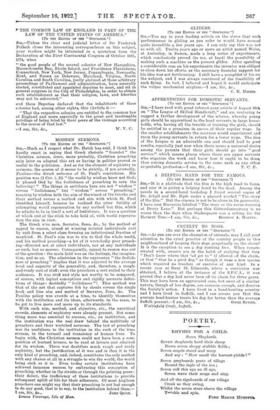F` THE COMMON LAW OF ENGLAND IS PART OF rini
LAW OP THE 'UNITED STATES OF AMERICA." [To THE EDITOR OF THE " SPECTATOR."]
Sra,—Unless the clear and judicial letter of Sir Frederick Pollock closes the interesting correspondence on this subject, your readers might be interested in a quotation from the Declaration of the First Continental Congress of October 14th, 1774, when " the good people of the several colonies of New Hampshire, Massachusetts Bay, Rhode Island, and Providence Plantations, Connecticut, New York, New Jersey, Pennsylvania, Newcastle, Kent, and Sussex on Delaware, Maryland, Virgina, North Carolina and South Carolina, justly alarmed at these arbitrary proceedings of Parliament and administration, have severally elected, constituted and appointed deputies to meet, and sit in general congress in the City of Philadelphia, in order to obtain such establishment as that their religion, laws, and liberties may not be subverted,"
and these Deputies declared that the inhabitants of these colonies had, among other rights, this (Article 5):—
"That the respective colonies are entitled to the common law of England and more especially to the great and inestimable privilege of being tried by their peers of the vicinage according to the course of that law.'


































 Previous page
Previous page